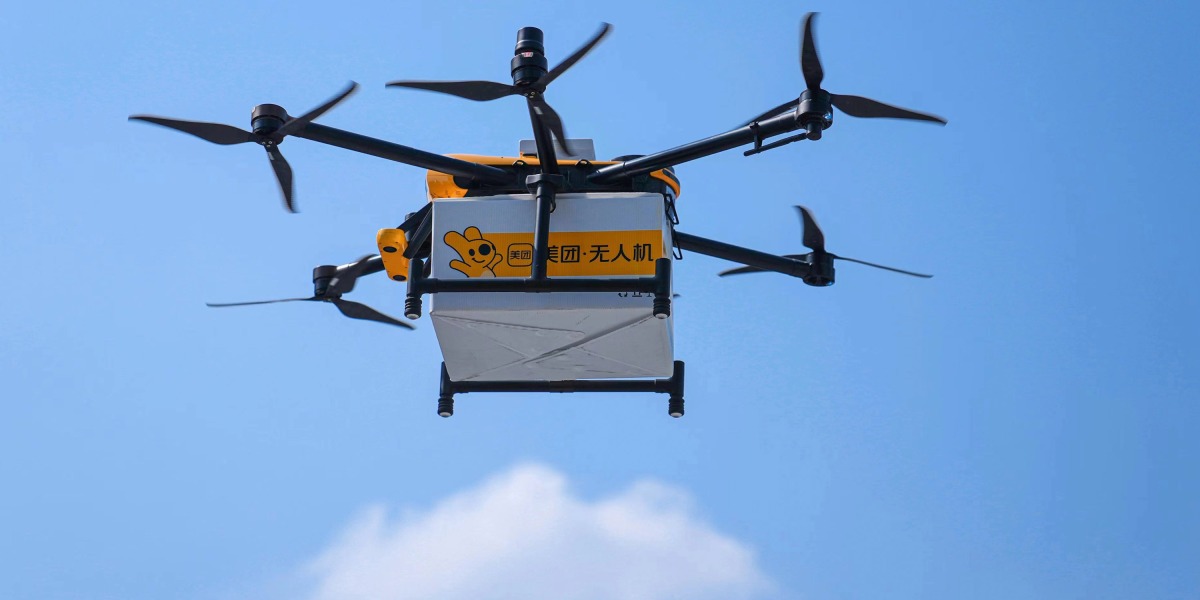The Download: urban drone deliveries, and our guide to AI regulations
This is today’s edition of The Download, our weekday newsletter that provides a daily dose of what’s going on in the world of technology.
Food delivery by drone is just part of daily life in Shenzhen
—Zeyi Yang
In a buzzy urban area in Shenzhen, China, I watched as a drone descended onto a pickup kiosk to deliver the iced tea I’d ordered half an hour earlier. The delivery service is operated by Meituan, China’s most popular food delivery platform, which has been making regular drone deliveries to the city’s residents for the past year and a half.
What differentiates Meituan from its American peers is that it’s flying drones in potentially the most challenging environment: dense urban neighborhoods. For some Shenzhen residents and vendors, delivery by drone is no longer a novelty—it’s part of their daily routine. And the company’s progress shows that regular drone delivery in cities is possible. Read the full story.
Our quick guide to the 6 ways we can regulate AI
AI regulation is hot. Ever since the success of OpenAI’s chatbot ChatGPT, the public’s attention has been grabbed by wonder and worry about what these powerful AI tools can do.
Tech CEOs, US senators and leaders at the G7 summit are all united in their desire for international standards and stronger guardrails to govern AI. Melissa Heikkilä, our senior AI reporter, has analyzed six different international attempts to regulate the technology, and given each of them a score for how influential they are. Take a look at what she came up with.
This story is part of our Tech Review Explains series, dedicated to untangling the complex, sometimes messy, world of science and technology to help you understand what’s going on. Check out the other stories in the series.
And if you’d like to hear more of Melissa’s incisive thoughts on AI regulation, check out the latest edition of The Algorithm, her weekly AI newsletter, all about the prospects for AI regulation in the US. Sign up to receive it in your inbox every Monday.
Brain waves can tell us how much pain someone is in
The news: Brain signals can be used to detect how much pain a person is experiencing, which could overhaul how we treat certain chronic pain conditions, a new study has suggested. Electrodes implanted in the brains of four people living with chronic pain helped researchers to track their individual levels of pain, and to train an AI model to accurately predict its severity.
Why it’s important: Because we still don’t really understand how chronic pain affects the brain, it’s very difficult to treat. This research is the first time a human’s chronic-pain-related brain signals have been recorded, and it could aid the development of personalized therapies for the most severe forms of pain. Read the full story.
—Rhiannon Williams
Meta’s new AI models can recognize and produce speech for more than 1,000 languages
What’s happened: Meta has built AI models that can recognize and produce speech for more than 1,000 languages—a tenfold increase on what’s currently available. It’s making them open source to help developers working in different languages to build new speech applications—like messaging services that understand everyone, or virtual-reality systems that can be used in any language.
Why it matters: Meta says the new project is a significant step toward preserving languages that are at risk of disappearing. Although there are around 7,000 languages in the world, existing speech recognition models cover only about 100 of them. Read the full story.
—Rhiannon Williams
The must-reads
I’ve combed the internet to find you today’s most fun/important/scary/fascinating stories about technology.
1 A verified Twitter account spread a fake AI image of an explosion at the Pentagon
Once again, it demonstrates the danger of allowing users to pay for verification. (WP $)
+ The account, masquerading as Bloomberg, has been suspended. (TechCrunch)
2 TikTok is suing Montana for banning it
It joins a group of disgruntled creators who are already suing the state. (The Guardian)
+ The app’s cloud provider has been caught up in the US-TikTok drama. (The Information $)
3 A major watchdog proposed the first international crypto rules
It’s urging regulators to stop dilly-dallying and just push forward with its suggestions. (FT $)
+ Who are memecoins really for? (Wired $)
+ What’s next for crypto. (MIT Technology Review)
4 The US needs more resilient internet networks
The problem is, authorities aren’t likely to invest in them without the imminent threat of natural disasters. (The Verge)
5 Big Tech’s image recognition systems still have a problem with gorillas
Eight years after mislabeling Black people as apes, they still haven’t fixed it. (NYT $)
+ Of course technology perpetuates racism. It was designed that way. (MIT Technology Review)
6 What chips can tell us about US-China relations
The US is increasingly nervous about Beijing’s potential plans to invade Taiwan. (The Guardian)
+ Why China is so concerned about Starlink. (Economist $)
7 We’re getting closer to treating genetic diseases in the womb
Preventing diseases before they even develop is wildly ambitious, yet increasingly achievable. (Wired $)
+ Doctors have performed brain surgery on a fetus. (MIT Technology Review)
8 Amazon will let you buy alcohol using your palm
And it’s testing it on sports fans. Risky. (CNBC)
+ Tencent wants you to pay with your palm. What could go wrong? (MIT Technology Review)
9 China’s tech-savvy doctors are going viral
They’re so popular, doctor-influencers have become a profitable industry in their own right. (Rest of World)
10 Not everyone in Hollywood is petrified of AI
The movie industry’s visual effects artists are intrigued by it. (The Information $)
Quote of the day
“There’s no such thing as living off the grid.”
—Jack Cooper, a program manager working for the Pentagon’s intelligence branch, explains it’s becoming impossible to protect your privacy in today’s society, Motherboard reports.
The big story
Uyghurs outside China are traumatized. Now they’re starting to talk about it

June 2021
The Uyghur diaspora have been forced to watch from afar as their loved ones disappear and a way of life is erased. The trauma has sparked a mental health crisis that leaders in the diaspora say is all too apparent.
Many are reluctant to seek help, leaving the community’s needs both underassessed and unmet. But a small group of outspoken Uyghurs is trying to change that. Using social media, they’re starting conversations about grief and mental health and, through telehealth, connecting people across the country with volunteer therapists. Read the full story.
—Andrew McCormick
We can still have nice things
A place for comfort, fun and distraction in these weird times. (Got any ideas? Drop me a line or tweet ’em at me.)
+ I had no idea worm charming was a thing, but needless to say, I now desperately need to know more.
+ We know that Bloody Marys are an acquired taste, but seriously—a pizza-flavored cocktail?!
+ A new Las Vegas housing development is naming all its streets after Pokémon, and Snorlax Lane is looking mighty appealing.
+ A spa on a train sounds like a recipe for disaster, but it works, apparently.
+ This is cool: hundreds of new species have been discovered: but we need to protect them.



